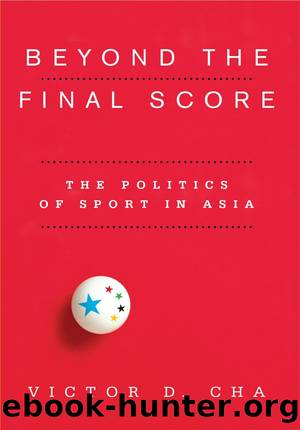Beyond the Final Score: The Politics of Sport in Asia by Victor Cha

Author:Victor Cha [Cha, Victor]
Language: eng
Format: epub
Tags: International Relations, Sports & Recreation, Political Science, Asia, History, China, General, Olympics & Paralympics
ISBN: 9780231154901
Google: auEZiUTLqWcC
Goodreads: 5249805
Publisher: Columbia University Press
Published: 2008-12-01T00:00:00+00:00
DIPLOMACY AND THE ASIAN GAMES
What role did sport play in facilitating the improved Sino-ROK relations? A confluence of structural factors (e.g., the end of the Cold War, the end of the Sino-Soviet split) and domestic factors (e.g., zero-sum diplomacy with DPRK and Taiwan; economic complementarities) inclined Seoul and Beijing to improve relations. A fortuitous set of events surrounding the tenth and eleventh Asian Games in 1986 and 1990, however, helped to facilitate the transition from largely economic cooperation in the 1980s to political cooperation and eventual normalization.
The two summer Asiadsâa slimmed-down regional version of the Olympicsâwere scheduled to be held in 1986 in Seoul and in 1990 in Beijing. For Seoul, the Games were effectively a dress rehearsal for the 1988 Olympics, and planners worked feverishly to complete most of the construction for the Olympic venues in time for the 1986 event (which I discuss in more detail in next chapter). As I noted, Seoul wanted to ensure maximum participation for the Olympics after the boycotts in 1980 and 1984, so the effort started with ensuring maximum participation at the 1986 Asiad from countries across the Cold War divide. The organizing committee lobbied China to send a large delegation. The plan was for the Chinese officials and athletes to come to Seoul, perform well in the competitions, and generally have a good time. Through this experience, broadcast throughout Asia, the Asiad could build goodwill and change Chinese and South Korean popular perceptions, which were largely antagonistic.
The plan worked. China ended up having the largest delegation at the Games. The Chinese team performed well, tallying the most gold medals (ninety-four) and coming in second in the total medal count (to the ROK hosts). Visiting athletes and officials praised the Koreansâ hospitality and friendliness. Visiting dignitaries, moreover, returned to China with a newfound respect and interest in Koreaâs modernization. Chinese government-run media outlets gave glowing commentary on the way Korea had combined Western modernity with Confucian traditions. The Communist Party journal Hongqi (Red Flag) and the prestigious literary journal Renmin Wenxue (Peopleâs Literature) were awash with lengthy observations of the Seoul Asiad. As Chae-jin Lee noted, these reports,
praised the neatness and modernity of Seoul, the bustling South Gate market, the majesty of the Kyungbok Palace, the modern facility of Chungang Ilbo (a major South Korean newspaper), and the beautiful students at Ewha Womenâs University. [One article] observed that Korean girls always smiled and wore modern dress but observed traditional customsâ¦. [The Chinese author] was impressed that many South Koreans volunteered to work for the Asian Games. He vividly described the opening and closing ceremonies that emphasized Korean traditions.18
Because of the superior performance of their athletes, the Chinese had every incentive to broadcast the Seoul games widely at home. This had the effect of conveying to a wider Chinese audience images of a cosmopolitan Seoul, which starkly contrasted with the destitute and poverty-stricken picture of the DPRK. The DPRKâs state-run newspaper, Nodong Sinmun, blasted Seoulâs successful games as a plot to perpetuate the peninsulaâs division.
Download
This site does not store any files on its server. We only index and link to content provided by other sites. Please contact the content providers to delete copyright contents if any and email us, we'll remove relevant links or contents immediately.
Six Minutes in Berlin: Broadcast Spectacle and Rowing Gold at the Nazi Olympics by Michael J. Socolow(149)
Scientific Principles of Strength Training: With Applications to Powerlifting (Renaissance Periodization Book 3) by Dr. Mike Israetel Dr. James Hoffmann Chad Wesley Smith(145)
Jailhouse Journalism by James McGrath Morris(116)
Beyond the Final Score: The Politics of Sport in Asia by Victor Cha(97)
The Telegraph Book of the Olympics by Martin Smith(96)
The Sovereign Colony by Antonio Sotomayor(91)
Sport, Globalisation and Identity by Jim O'Brien Russell Holden Xavier Ginesta(91)
Tarnished Rings by Stephen Wenn(90)
Drug Games : The International Olympic Committee and the Politics of Doping, 1960-2008 by Thomas M. Hunt; John Hoberman(83)
How to Watch the Olympics: The Essential Guide to the Rules, Statistics, Heroes, and Zeroes of Every Sport by David Goldblatt & Johnny Acton(73)
Understanding International Sport Organisations: Principles, Power and Possibilities by Lincoln Allison & Alan Tomlinson(71)
Soccer Diplomacy: International Relations and Football since 1914 (Studies in Conflict, Diplomacy, and Peace) by Heather L. Dichter (editor)(70)
The Olympic's Most Wanted™ by Floyd Conner(66)
